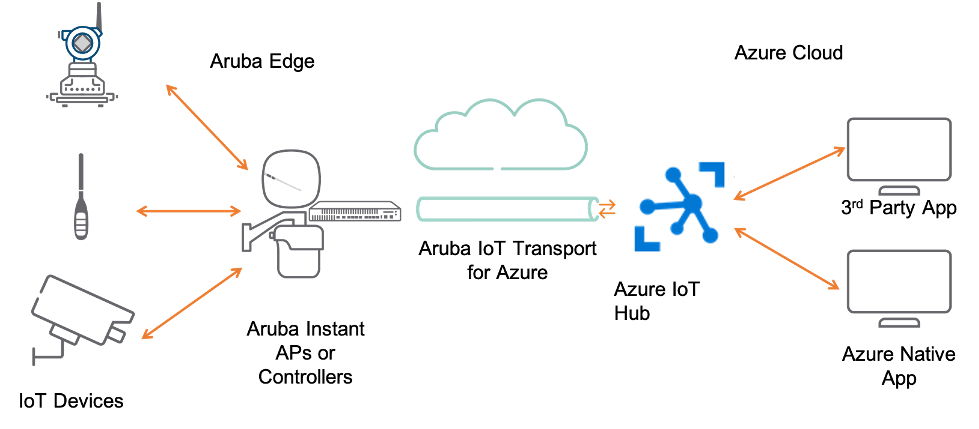
IT infrastructure is the lifeblood of most enterprise business applications and processes. The infrastructure is pervasive across all locations, uptime is actively managed, and cybersecurity is both of paramount concern and the focus of time and resources. It is no wonder, then, that IT teams are being bombarded with requests to connect all manner of Internet of Things (IoT) devices to the corporate network including HVAC controls, video surveillance cameras, time clocks, air quality monitors, and even gunshot detectors.
Connecting and Protecting IoT Devices
Connecting and protecting these devices is no mean feat, and Aruba has spent years perfecting the integration of untrustworthy IoT devices into its zero trust Edge Services Platform (ESP) IT networks. Features like identity-based access control, dynamically segmented secure tunnels, and coordination with next gen firewalls and other security systems ensure that IoT devices are securely connected with their target applications and that infected devices are contained.
To simplify the connection of wireless IoT devices, Aruba has transformed its access points into full-fledged IoT platforms. Multiple access point IoT radios can support all manner of IoT devices without the need for external gateways, a design approach that is extensible, highly economical, and consistent with Aruba’s zero trust framework. Where the IoT data go next is where the Aruba IoT Transport for Microsoft Azure comes into play.
How IoT data are processed and integrated with business processes or digital twin applications is typically left as an exercise for end customers. Problem is this isn’t a task for the uninitiated – it requires deep knowledge of IoT, data transport, data security, and business applications. The complexity of this process is often farmed out to third party integrators, a costly proposition that leaves the customer at risk of a dependency on a third party for business-critical functions. Costs multiply every time there is an add, move, or change.
Introducing Aruba IoT Transport for Microsoft Azure
IoT Transport for Azure addresses this issue by securely connecting IoT devices with the Azure IoT Hub where customers can begin monitoring, controlling, and analyzing IoT systems, digital twin enablement or utilize other applications or services available from or for the Azure IoT platform. Aruba access points –Instant and controller-based – act as virtual IoT gateways, wirelessly connecting to IoT devices, establishing secure connections with the Azure IoT Hub, and bidirectionally streaming IoT data through the secure tunnels. For convenience data are automatically converted to JSON for consumption by Azure services and applications.

Aruba Wi-Fi 6 access points support Wi-Fi, BLE, 802.15.4/Zigbee, and through plug-in adapters a wide range of 800/900MHz IoT and OT devices. To start, certified BLE and 800/900MHz IoT and OT devices will be able to use IoT Transport for Azure, making those access points gateways to the Azure IoT Hub. The access points currently support thousands of different certified IoT and OT devices from a growing number of prominent vendors.
Simplified, Secure Design with IoT Transport for Microsoft Azure
This design significantly simplifies the secure, bidirectional transfer of data between edge IoT devices and Azure IoT using existing Aruba IT infrastructure as the linkage between the two. Customers are freed from the expense of hiring integrators to create a useable network connection for them or crafting their own edge-to-cloud solution.
Since the Aruba certified IoT devices communicate with Aruba access points, and Aruba access points communicate with the Azure IoT Hub, no additional IoT hardware gateway is required. New IoT use cases can be easily handled without the need to rip-and-replace edge infrastructure. Simply on-board the new IoT devices and proceed to the Azure IoT Hub where your data will be deposited.
Eliminating the need for an additional hardware gateway has many advantages:
- Lowers latency between IoT devices and the Azure IoT Hub
- Eliminates a major security vulnerability and attack targets
- Avoids CISO issues with attaching an IoT device directly to a corporate network
- Lowers lifecycle costs by eliminating hardware, licensing and maintenance fees, Ethernet cabling and switch port, and installation labor
- Simplifies system management by reducing the number of devices that need to be monitored and updated
New IoT use cases can be easily handled without the need to rip-and-replace edge infrastructure. Customers can leverage the power of Microsoft Azure to maintain and manage the processing, analytics, and storage – or- utilize the customer’s own custom applications within Azure. Customers can select from a wide range of Azure IoT-related applications or services or use their own apps to analyze and act upon the data generated from the devices.
The Aruba IoT Transport for Azure is delivered as a service in ArubaOS 8.8 and is also available as a cloud-based service for customers using ArubaOS 8.7.
With the Aruba IoT Transport for Azure, your enterprise network can securely handle all manner of IoT devices and integrate them with enterprise business applications and processes. Deployment time is fraction of what a custom developed solution would entail, so you’ll be driving in the express lane to time-to-insight and time-to-value.
Go deeper




